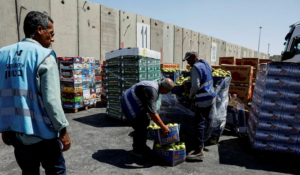Israel’s Arab community donated dozens of tons of aid to Gaza but Israel blocks its entry

Men load humanitarian aid destined for the Gaza Strip at the Kerem Shalom crossing in southern Israel, 10 July 2024
Jack Khoury reports in Haaretz on 2 September 2024:
The Israeli government has blocked dozens of tons of aid raised by its Arab community from reaching Gaza, citing concerns that it could end up in Hamas’ hands. The Coordinator of Government Activities in the Territories, the government’s civilian authority in the West Bank, told Haaretz that Israeli-sourced donations have been banned since the beginning of the war.
It said only aid donated from abroad or goods purchased from merchants in the West Bank, coordinated and inspected by authorities, is allowed into Gaza.
Over the past few weeks, several initiatives by the Arab community have organized donating drives to show solidarity with the residents and address its hunger crisis. Last month, the Standing Together organization, dedicated to Jewish-Arab partnership, organized a drive that resulted in around 100 trucks being loaded with 2,400 pallets of food and essential goods. The collected items included basic food items, cleaning supplies, personal hygiene products and baby products. However, this substantial amount of aid remains in storage because of the government decision to prohibit the transfer of donations from Israelis to the Strip.
Israel’s Civil Administration confirmed in a conversation with “Haaretz” that at the beginning of the war, the political echelon prohibited the introduction of aid into the Gaza Strip if it originated from donations by Israelis, on the grounds that it might end up in the hands of Hamas and enable the continuation of its rule.
Only aid donated from abroad or goods purchased by Gazan merchants from West Bank merchants is permitted entry, subject to coordination and inspection by the Israeli authorities.
Israel permits the entry of 300 trucks of aid per day, originating from foreign assistance or purchases in the West Bank, primarily through Israeli border crossings like Kerem Shalom. The Coordinator of Government Activity in the Territories said that without a change in policy, the aid won’t be allowed in. Despite this, the organizations who collected the aid say they have not lost hope.
Mohammed Barakeh, chairman of the High Follow-up Committee for Arab Citizens of Israel, says there have recently been efforts to negotiate with officials in Gaza and regional Palestinian authorities to examine possibilities for the introduction of aid, which was collected in part in cooperation with activists affiliated with Israeli-Arab political parties Ra’am and Hadash.
Haaretz learned that attempts are also being made to develop a plan for the aid to go through international organizations and embassies in the region, thereby being classified as foreign aid.
“After 10 months of war in Gaza, bombs, destruction, and starvation, along with a campaign of persecution and silencing of Palestinian citizens of Israel, the Arab community will no longer remain silent,” says Rula Daood, co-national director of Standing Together. The initiative was widely publicized on social media, and many local charitable organizations in various communities also set up collection drives.
The donation push has also sparked a debate within the Arab community over the fact that aid is collected without the oversight of the Higher Arab Monitoring Committee, and that the institution that encompasses all the community’s political movements is not leading the operation. The committee said that despite the community’s commitment to helping Gaza’s civilians, it cannot ignore the fact that authorities are not allowing it to enter.
“We are following the aid campaign, and it truly warms the heart,” says Barakeh. “However, there is no reason for the donations to be stored for extended periods, as some could spoil. It is crucial to ensure that the packages reach the civilians in Gaza who need help and to prevent any exploitation by any party.”
This article is reproduced in its entirety
